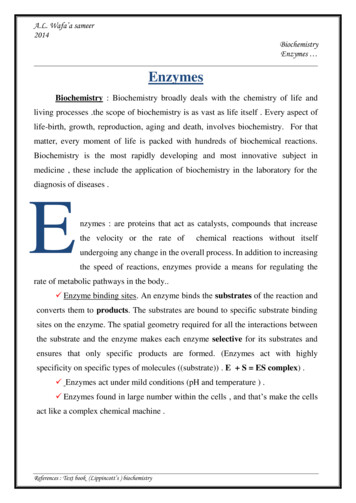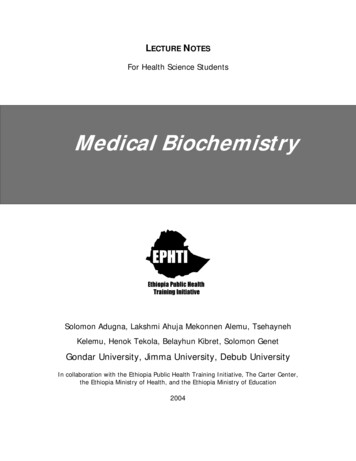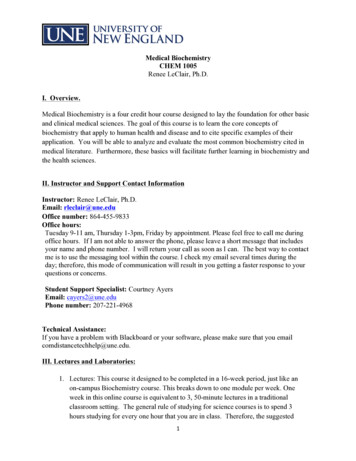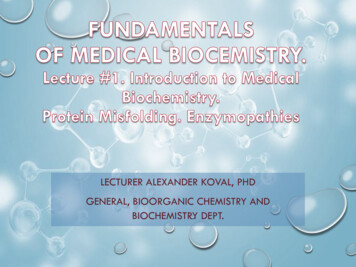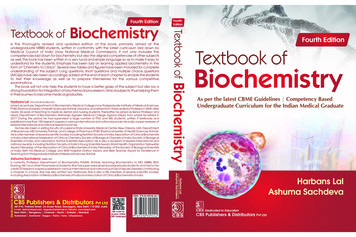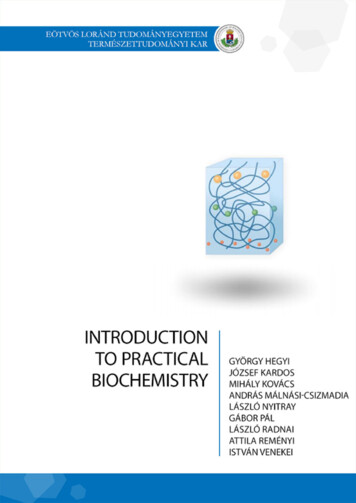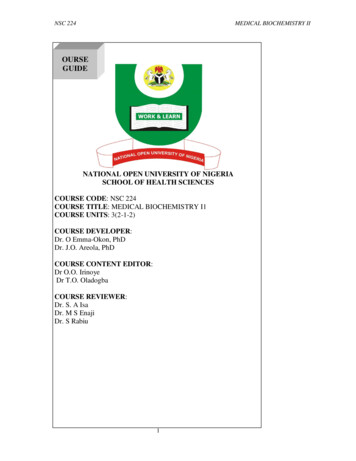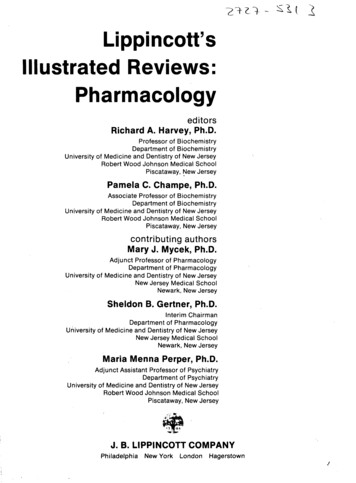
Transcription
Biochemistry (CASNR)BIOCHEMISTRY (CASNR)school golf coach is required. For more information, please visit http://pgm.unl.edu/requirements ssion Deficiencies/Removal of DeficienciesThe Department of Biochemistry offers studies leading to either abachelor of science (BS) or to a combined bachelors and masters degree(BS and MS) in biochemistry. There are two options available for theundergraduate program: Standard Biochemistry Option, which is thetraditional biochemistry major, and the Computational and SystemsBiochemistry Option, which integrates concepts and skills from thecore biochemistry requirements with additional study in mathematics,statistics, and computer science. The training offered through bothoptions is suitable for a professional career in biochemistry, which maylead to employment in various industries involved in the manufacture orprocessing of chemicals, foods, feeds, and pharmaceuticals or federalagencies such as the Food and Drug Administration, U.S. Departmentof Agriculture, U.S. Public Health Service, and Environmental ProtectionAgency. Both options are suitable as preparation for graduate studiesleading to academic careers in biochemistry and professional careersin medicine, dentistry, veterinary medicine, and health-related fields.The Computational and Systems Biochemistry Option aims at preparingstudents to address questions using quantitative and multidisciplinaryapproaches in fields such as health, agriculture, and biotechnology. TheDepartment is accredited by the American Society of Biochemistry andMolecular Biology (ASBMB), meaning seniors who sit for the ASBMBcertification exam are recognized as earning a certified degree if theyreceive a qualifying score.The combined bachelors and masters degree in biochemistry isespecially tailored for highly-motivated undergraduate students withsuperior ability who seek additional training to further their career goals.This research thesis-based program is designed to provide opportunitiesto students to carry out and interpret contemporary research.Graduate Work. Advanced degrees of master of science and doctorof philosophy are available. For details, consult the Graduate StudiesCatalog.Laboratory Fee and Deposit. Students who enroll in laboratory coursesin the Department of Biochemistry may be required to pay a smallnon-refundable cash fee to defray the cost of materials consumed inthe course and a deposit to cover the cost of replacing or repairingequipment the student may damage in the laboratory.College RequirementsCollege AdmissionRequirements for admission into the College of Agricultural Sciencesand Natural Resources (CASNR) are consistent with general Universityadmission requirements (one unit equals one high school year): 4 unitsof English, 4 units of mathematics, 3 units of natural sciences, 3 unitsof social sciences, and 2 units of world language. Students must alsomeet performance requirements: a 3.0 cumulative high school gradepoint average OR an ACT composite of 20 or higher, writing portion notrequired OR a score of 1040 or higher on the SAT Critical Reading andMath sections OR rank in the top one-half of graduating class; transferstudents must have a 2.0 (on a 4.0 scale) cumulative grade point averageand 2.0 on the most recent term of attendance. For students enteringthe PGA Golf Management degree program, a certified golf handicapof 12 or better (e.g., USGA handicap card) or written ability (MS Wordfile) equivalent to a 12 or better handicap by a PGA professional or high1Students who are admitted to CASNR with core course deficiencies mustremove these deficiencies within the first 30 credit hours at the Universityof Nebraska–Lincoln, or within the first calendar year at Nebraska,whichever takes longer, excluding foreign languages. Students have upto 60 credit hours to remove world language deficiencies. College-levelcoursework taken to remove deficiencies may be used to meet degreerequirements in CASNR.Deficiencies in the required entrance subjects can be removed by thecompletion of specified courses in the University or by correspondence.The Office of Admissions, Alexander Building (south entrance), CityCampus, provides information to new students on how deficiencies canbe removed.College Degree RequirementsCurriculum RequirementsThe curriculum requirements of the College consist of three areas: ACE(Achievement-Centered Education), College of Agricultural Sciences andNatural Resources Core, and Degree Program requirements and electives.All three areas of the College Curriculum Requirements are incorporatedwithin the description of the Major/Degree Program sections of thecatalog. The individual major/degree program listings of classes ensuresthat a student will meet the minimum curriculum requirements of theCollege.World Languages/Language RequirementTwo units of a world language are required. This requirement is usuallymet with two years of high school language.Minimum Hours Required for GraduationThe College grants the bachelors degree in programs associated withagricultural sciences, natural resources, and related programs. Studentsworking toward a degree must earn at least 120 semester hours of credit.A minimum cumulative grade point average of C (2.0 on a 4.0 scale)must be maintained throughout the course of studies and is required forgraduation. Some degree programs have a higher cumulative grade pointaverage required for graduation. Please check the degree program on itsgraduation cumulative grade point average.Grade RulesRemoval of C-, D, and F GradesOnly the most recent letter grade received in a given course will be usedin computing a student’s cumulative grade point average if the studenthas completed the course more than once and previously received agrade or grades below C in that course.The previous grade (or grades) will not be used in the computation of thecumulative grade point average, but it will remain a part of the academicrecord and will appear on any transcript.A student can remove from his/her cumulative average a course grade ofC-, D , D, D-, or F if the student repeats the same course at the Universityof Nebraska and receives a grade other than P (pass), I (incomplete), N(no pass), W (withdrew), or NR (no report). If a course is no longer beingoffered, it is not eligible for the revised grade point average computationprocess.
2Biochemistry (CASNR)For complete procedures and regulations, see the Office of the UniversityRegistrar website at http://www.unl.edu/regrec/course-repeats o PassStudents in CASNR may take any course offered on a Pass/No Passbasis within the 24-hour limitation established by the Faculty Senate.However, a department may specify that the Pass/No Pass status of itscourses be limited to non-majors or may choose to offer some coursesfor letter grades only.GPA RequirementsA minimum cumulative grade point average of C (2.0 on a 4.0 scale)must be maintained throughout the course of studies and is required forgraduation. Some degree programs have a higher cumulative grade pointaverage required for graduation. Please check the degree program on itsgraduation cumulative grade point average.Transfer Credit RulesTo be considered for admission, a transfer student, Nebraska resident ornonresident, must have an accumulated average of C (2.0 on a 4.0 scale)and a minimum C average in the last semester of attendance at anothercollege. Transfer students who have completed less than 12 credit hoursof college study must submit either ACT or SAT scores.Ordinarily, credits earned at an accredited college are accepted by theUniversity. The College, however, will evaluate all hours submitted onan application for transfer and reserves the right to accept or rejectany of them. Sixty (60) is the maximum number of hours the Universitywill accept on transfer from a two-year college. Ninety (90) is themaximum number of hours the University will accept from a four-yearcollege. Transfer credit in the degree program must be approved bythe degree program advisor on a Request for Substitution Form tomeet specific course requirements, group requirements, or course levelrequirements in the major. At least 9 hours in the major field, includingthe capstone course, must be completed at the University of Nebraska–Lincoln regardless of the number of hours transferred.The College will accept no more than 10 semester hours of C-, D , D, andD- grades from other schools. The C-, D , D, and D- grades can only beapplied to free electives. This policy does not apply to the transfer ofgrades from UNO or UNK to the University of Nebraska–Lincoln.Joint Academic Transfer ProgramsThe College of Agricultural Sciences and Natural Resources hasagreements with many institutions to support joint academic programs.The transfer programs include dual degree programs and cooperativedegree programs. Dual degree programs offer students the opportunityto receive a degree from a participating institution and also to completerequirements for a bachelor of science degree in CASNR. Cooperativeprograms result in a single degree from either the University ofNebraska–Lincoln or the cooperating institution.Dual Degree ProgramsA to B ProgramsThe A to B Program, a joint academic program offered by the CASNR andparticipating community colleges, allows students to complete the firsttwo years of a degree program at the participating community collegeand continue their education and study in a degree program leadingtoward a bachelor of science degree.The A to B Program provides a basic knowledge plus specializedcoursework. Students transfer into CASNR with junior standing.Depending on the community college, students enrolled in the A to BProgram may complete the requirements for an associate of science atthe community college, transfer to the University of Nebraska–Lincoln,and work toward a bachelor of science degree.Participating community colleges include: Central Community College Metropolitan Community College Mid-Plains Community College Nebraska College of Technical Agriculture Nebraska Indian Community College Northeast Community College Southeast Community College Western Nebraska Community College3 2 ProgramsTwo specialized degree programs in animal science and veterinaryscience are offered jointly with an accredited college or school ofveterinary medicine. These two programs permit CASNR animal scienceor veterinary science students to receive a bachelor of science degreefrom the University of Nebraska–Lincoln with a degree in animal scienceor veterinary science after successfully completing two years of theprofessional curriculum in veterinary medicine at an accredited veterinaryschool. Students who successfully complete the 3 2 Program, mustprovide transcripts and complete the Application for Degree form viaMyRED. Students without MyRED access may apply for graduation inperson at Husker Hub in the Canfield Administration Building, or by mail.Students should discuss these degree programs with their academicadvisor.Cooperative Degree ProgramsAcademic credit from the University and a cooperating institutionare applied towards a four-year degree from either the Universityof Nebraska–Lincoln (University degree-granting program) or thecooperating institution (non University degree-granting program). All haveapproved programs of study.UNL Degree-Granting ProgramsA University of Nebraska–Lincoln degree-granting program is designedto provide students the opportunity to complete a two-year program ofstudy at one of the four-year institutions listed below, transfer to CASNR,and complete the requirements for a bachelor of science degree.Chadron State College. Chadron State College offers a 2 2 programleading to a grassland ecology and management degree program anda transfer program leading to a bachelor of science in agriculturaleducation in the teaching option.Wayne State College. Wayne State College offers a 3 1 program leadingto a bachelor of science in plant biology in the ecology and managementoption and a 3 1 program leading to a bachelor of science in AppliedScience.University of Nebraska at Kearney. Transfer programs are available forstudents pursuing degree programs leading to a bachelor of sciencedegree.
Biochemistry (CASNR)University of Nebraska at Omaha. Transfer programs are available forstudents pursuing degree programs leading to a bachelor of sciencedegree.Independent study projects include research, literature review orextension of coursework under supervision and evaluation of adepartmental faculty member.Non University of Nebraska–Lincoln Degree-Granting ProgramsStudents may only count 12 hours of independent study toward theirdegrees and no more than 6 hours can be counted during their last 36hours earned, excluding senior thesis, internships, and courses taughtunder an independent study number.CASNR cooperates with other institutions to provide coursework that isapplied towards a degree at the cooperating institution. Pre-professionalprograms offered by CASNR allow students to complete the first two orthree years of a degree program at the University prior to transferring andcompleting a degree at the cooperating institution.Chadron State College–Range Science. The 3 1 Program in rangescience allows Chadron State College students to pursue a range sciencedegree through Chadron State College. Students complete three years ofcoursework at Chadron State College and one year of specialized rangescience coursework (32 credit hours) at CASNR.Dordt College (Iowa)–Agricultural Education: Teaching Option. Thisprogram allows students to pursue an Agricultural Education TeachingOption degree leading toward a bachelor of science in agriculturaleducation. Students at Dordt College will complete 90 credit hours in theAgricultural Education: Teaching Option Transfer Program.ResidencyStudents must complete at least 30 of the total hours for their degreeusing University of Nebraska–Lincoln credits. At least 18 of the 30 credit1hours must be in courses offered through CASNR ( 299) includingthe appropriate ACE 10 degree requirement or an approved ACE 10substitution offered through another Nebraska college and excludingindependent study regardless of the number of hours transferred.Credit earned during education abroad may be used toward theresidency requirement if students register through the University ofNebraska–Lincoln and participate in prior-approved education abroadprograms. University of Nebraska–Lincoln open enrollment and summerindependent study courses count toward residence.1Includes courses taught by CASNR faculty through interdisciplinaryprefixes (e.g., LIFE, MBIO, ENVR, SCIL, EAEP, HRTM, ENSC) and CASNRcrosslisted courses taught by non-CASNR faculty.Online and Distance EducationThere are many opportunities to earn college credit online throughthe University of Nebraska–Lincoln. Some of these credits may beapplicable not only as elective credits but also toward the fulfillment ofthe College’s education requirements. Credits earned online may counttoward residency. However, certain offerings may not be counted towardscholarship requirements or academic recognition criteria.For further information, contact:Office of Online and Distance EducationUniversity of Nebraska–Lincoln305 Brace LabsLincoln, NE ndent Study RulesStudents wishing to take part in independent studies must obtainpermission; complete and sign a contract form; and furnish copies of thecontract to the instructor, advisor, departmental office, and the Dean’sOffice. The contract should be completed before registration. Forms areavailable in 103 Agricultural Hall or online at the CASNR website.3Other College Degree RequirementsCapstone Course RequirementA capstone course is required for each CASNR degree program. Acapstone course is defined as a course in which students are required tointegrate diverse bodies of knowledge to solve a problem or formulate apolicy of societal importance.ACE RequirementsAll students must fulfill the Achievement Centered Education (ACE)requirements. Information about the ACE program may be viewed atace.unl.edu (https://ace.unl.edu/).The minimum requirements of CASNR reflect the common core ofcourses that apply to students pursuing degrees in the college. Studentsshould work with an advisor to satisfy ACE outcomes 1, 2, 3, 4, 6, and 10with the college requirements.Catalog RuleStudents must fulfill the requirements stated in the catalog for theacademic year in which they are first admitted to the University ofNebraska–Lincoln or when they were first admitted to a Joint AcademicTransfer Program. In consultation with advisors, a student may chooseto follow a subsequent catalog for any academic year in which they areadmitted to and enrolled as a degree-seeking student at Nebraska in theCollege of Agricultural Sciences and Natural Resources. Students mustcomplete all degree requirements from a single catalog year. The catalogwhich a student follows for degree requirements may not be more than10 years old at the time of graduation.Learning OutcomesGraduates of biochemistry in the Standard Biochemistry Option will beable to:1. Apply the basic principles of the physical sciences to the study ofbiological systems to explain how organisms consume and convertenergy to enable the processes of life.2. Attribute the function and regulation of biomolecules to specificmacromolecular structures through the use of quantitative andanalytical computational techniques.3. Explain the flow of information through biological systems andpredict the impact of environmental or biological variables on systemoutput.4. Analyze, interpret, critique, and communicate data and ideasconcerning topics at the forefront of biochemistry.Graduates of biochemistry in the Computational and SystemsBiochemistry Option will be able to:1. Explain the origin, rationale, and uses of large datasets used to studybiological processes in living organisms.2. Perform computational analyses of biological datasets and relate theresults to core principles in biochemistry and biology.
4Biochemistry (CASNR)3. Use existing computational methods and software to help execute aresearch plan.CHEM 251& CHEM 253Organic Chemistry Iand Organic Chemistry I Laboratory4. Address a scientific problem by exploiting biological datasets andcreating simple computational biology and/or bioinformatics tools.CHEM 261& CHEM 263Organic Chemistryand Organic Chemistry Laboratory5. Use discipline-specific tools and content knowledge to analyze andinterpret scientific data, evaluate the significance of the data, andarticulate conclusions supportable by the data.Select one sequence from the following:6. Independently and collaboratively formulate testable scientifichypotheses and design approaches to obtain data to test therespective hypotheses.Organic Chemistry IIand Organic Chemistry II LaboratoryCHEM 262& CHEM 264Organic Chemistryand Organic Chemistry LaboratoryCHEM 4717. Work in multidisciplinary and culturally diverse teams.Major RequirementsPhysical Chemistryor CHEM 481Physical Chemistry Ior BIOC 440Structural Biology and Biophysical ChemistrySelect one sequence from the following:Standard Biochemistry OptionSpecific Major RequirementsBiochemistry CoreBIOC 101Foundational Concepts & CareerOpportunities in Biochemistry1BIOC 205Scientific Analysis and Technical Writing2BIOC 431 /BIOS 431 /CHEM 431Biochemistry I: Structure and Metabolism3BIOC 432 /BIOS 432 /CHEM 432Biochemistry II: Metabolism and BiologicalInformation3BIOC 433 /BIOS 433 /CHEM 433Biochemistry Laboratory2BIOC 435Advanced Topics in Biochemistry (ACE 10)3SCIL 101Science and Decision-Making for aComplex World3PHYS 141& PHYS 142Elementary General Physics Iand Elementary General Physics IIPHYS 211& PHYS 212& PHYS 221& PHYS 222General Physics Iand General Physics IIand General Physics Laboratory Iand General Physics Laboratory IICredit Hours Subtotal:Natural SciencesLIFE 120& LIFE 120LFundamentals of Biology Iand Fundamentals of Biology I laboratory(ACE 4)4LIFE 121& LIFE 121LFundamentals of Biology IIand Fundamentals of Biology II Laboratory4BIOS 206General Genetics4MicrobiologyBIOS 313Molecular Microbiology LaboratoryCHEM 109A& CHEM 109L& CHEM 110A& CHEM 110L& CHEM 221General Chemistry Iand General Chemistry I Laboratoryand General Chemistry IIand General Chemistry II Laboratoryand Elementary Quantitative AnalysisCHEM 113A& CHEM 113L& CHEM 114& CHEM 221Fundamental Chemistry Iand Fundamental Chemistry I Laboratoryand Fundamental Chemistry IIand Elementary Quantitative AnalysisSelect one sequence from the following:49Calculus I (ACE 3)5MATH 107Calculus II49CommunicationsWritten Communication (ACE 1)ENGL 150Writing and InquiryENGL 151Writing and ArgumentENGL 254Writing and CommunitiesJGEN 120Basic Business CommunicationJGEN 200Technical Communication IJGEN 300Technical Communication IISelect one of the following:31-2Microbiology LaboratorySelect one sequence from the following:103Communication and Interpersonal Skills (ACE 2)or AGRO 215 / GeneticsHORT 215 /TLMT 215BIOS 3123-4MATH 106Credit Hours Subtotal:174-5Mathematics and StatisticsSelect one of the following:Credit Hours Subtotal:or BIOS 314CHEM 252& CHEM 25410-11ALEC 102Interpersonal Skills for LeadershipCOMM 101Communication in the 21st CenturyCOMM 209Public SpeakingCOMM 210Communicating in Small GroupsCOMM 215Visual CommunicationCOMM 286Business and Professional CommunicationJGEN 300Technical Communication IIMRKT 257Sales CommunicationNRES 301Environmental Communication SkillsTMFD 121Visual Communication and PresentationCredit Hours Subtotal:36Economics, Humanities, and Social SciencesECON 200Economic Essentials and Issues (ACE 8)3Select one course each from ACE outcomes 5, 6, 7, and 912Credit Hours Subtotal:15Free ElectivesSelect 20-24 credits4-520-24
Biochemistry (CASNR)Credit Hours Subtotal:Total Credit Hours24120NOTE: Within the same subject matter area, students may request a moreadvanced course be substituted for a required course.Computational and Systems Biochemistry OptionPHYS 211& PHYS 212& PHYS 221& PHYS 222General Physics Iand General Physics IIand General Physics Laboratory Iand General Physics Laboratory IIFoundational Concepts & CareerOpportunities in Biochemistry1BIOC 205Scientific Analysis and Technical Writing2BIOC 431 /BIOS 431 /CHEM 431Biochemistry I: Structure and Metabolism3BIOC 432 /BIOS 432 /CHEM 432Biochemistry II: Metabolism and BiologicalInformation3BIOC 433 /BIOS 433 /CHEM 433Biochemistry Laboratory2BIOC 435Advanced Topics in Biochemistry (ACE10, specific section in place for Optionstudents)3Science and Decision-Making for aComplex World3MATH 106Calculus I (ACE 3)5MATH 107Calculus II4Credit Hours Subtotal:Written Communication (ACE 1)ENGL 150Writing and InquiryENGL 151Writing and ArgumentENGL 254Writing and CommunitiesJGEN 120Basic Business CommunicationJGEN 200Technical Communication IJGEN 300Technical Communication IIALEC 102Interpersonal Skills for LeadershipCOMM 101Communication in the 21st CenturyCOMM 209Public SpeakingNatural SciencesCOMM 210Communicating in Small GroupsLIFE 120& LIFE 120LFundamentals of Biology Iand Fundamentals of Biology I laboratory(ACE 4)4COMM 215Visual CommunicationCOMM 286Business and Professional CommunicationLIFE 121& LIFE 121LFundamentals of Biology IIand Fundamentals of Biology II Laboratory4JGEN 300Technical Communication IIMRKT 257Sales CommunicationBIOS 206General Genetics4NRES 301Environmental Communication SkillsTMFD 121Visual Communication and Presentationor AGRO 215 / GeneticsHORT 215 /TLMT 215Select one sequence from the following:CHEM 109A& CHEM 109L& CHEM 110A& CHEM 110LCredit Hours Subtotal:7-8Organic Chemistry Iand Organic Chemistry I LaboratoryCHEM 261& CHEM 263Organic Chemistryand Organic Chemistry LaboratorySelect one sequence from the following:CHEM 252& CHEM 254Organic Chemistry IIand Organic Chemistry II LaboratoryCHEM 262& CHEM 264Organic Chemistryand Organic Chemistry LaboratorySelect one sequence from the following:6ECON 200Economic Essentials and Issues (ACE 8)3Select one course each from ACE outcomes 5, 6, 7, and 912Credit Hours Subtotal:15Computer Science & Systems Biochemistry RequirementsCHEM 113AFundamental Chemistry I& CHEM 113L and Fundamental Chemistry I Laboratory& CHEM 114 and Fundamental Chemistry IICHEM 251& CHEM 2533Economics, Humanities, and Social SciencesGeneral Chemistry Iand General Chemistry I Laboratoryand General Chemistry IIand General Chemistry II LaboratorySelect one sequence from the following:3Communication and Interpersonal Skills (ACE 2)Select one of the following:179CommunicationsSelect one of the following:Credit Hours Subtotal:38Mathematics and StatisticsBiochemistry CoreSCIL 101Elementary General Physics Iand Elementary General Physics IICredit Hours Subtotal:Specific Major RequirementsBIOC 101PHYS 141& PHYS 14254-54-5BIOC 437 /BIOS 437Research Techniques in Biochemistry4BIOS 337Applications of Bioinformatics4CSCE 155TComputer Science I: Informatics Focus3CSCE 156Computer Science II4CSCE 311Data Structures and Algorithms forInformatics3CSCE 361Software Engineering3CSCE 413Database Systems3STAT 380Statistics and Applications3Credit Hours Subtotal:27Computational Internship, needs 2 termsBIOC 9510Biochemistry InternshipCredit Hours Subtotal:Free Electives00
6Biochemistry (CASNR)Select 8 hours from the following:8or AGRO 215 / GeneticsHORT 215 /TLMT 215ASCI 432Genome AnalysisBIOS 213Human PhysiologyBIOS 213LHuman Physiology LaboratoryBIOS 426Systems BiologyBIOS 427Practical Bioinformatics LaboratoryBIOS 429Phylogenetic BiologyBIOS 456 /NRES 456Mathematical Models in BiologyBIOS 477Bioinformatics and Molecular EvolutionCSCE 423Design and Analysis of AlgorithmsTotal Credit HoursCSCE 458Molecular and Nanoscale CommunicationCSCE 459Genetically Engineered SystemsGrade RulesCSCE 471Computational Methods in BioinformaticsCSCE 492Special Topics in Computer ScienceA grade of C or above is required for all courses in the major or minor.ECEN 453Computational and Systems BiologyMATH 439Mathematical BiologyPass/No PassMicrobiologyBIOS 313Molecular Microbiology Laboratoryor BIOS 314CHEM 252or CHEM 262CHEM 254or CHEM 26431-2Microbiology LaboratoryOrganic Chemistry II3Organic ChemistryOrganic Chemistry II Laboratory1-2Organic Chemistry Laboratory18C- and D GradesCourses taken Pass/No Pass will not count toward the major or minor.Credit Hours Subtotal:Total Credit HoursBIOS 3128120Advanced Placement and International Baccalaureate CreditStudents who earned AP or IB credit for general chemistry in high schoolare still required to complete a freshman-level chemistry sequenceat an accredited post-secondary institution. These students areencouraged, but not required, to take CHEM 113A Fundamental ChemistryI and CHEM 113L Fundamental Chemistry I Laboratory/CHEM 114Fundamental Chemistry II rather than CHEM 109A General ChemistryI and CHEM 109L General Chemistry I Laboratory/CHEM 110A GeneralChemistry II and CHEM 110L General Chemistry II Laboratory. Highschool dual enrollment credit is not included in this policy.BIOC 95 Biochemistry InternshipPrerequisites: Biochemistry Major; Junior or Senior standing; PermissionNotes: Permission to enroll will be granted upon review of the proposedinternship by the supervising UNL faculty.Description: Provides an opportunity for a practical experience and careerexploration/development in a selected business, industry, agency oreducational institution. Activities must include a significant biochemistryand/or computational/systems biology component.Credit Hours: 0Max credits per semester:Max credits per degree:Grading Option: Pass No PassBIOC 101 Foundational Concepts & Career Opportunities in BiochemistryNotes: Interest in becoming a biochemistry major.Description: Introduction to the field of biochemistry and exploration ofbiochemistry related careers.Credit Hours: 1Max credits per semester: 1Max credits per degree: 1Grading Option: Graded with OptionOffered: FALL/SPRAdditional Major RequirementsGrade RulesC- and D GradesNo C- or D grades can be applied toward the biochemistry minor orbiochemistry degree requirements in any of the courses listed under thefollowing sections of Specific Major Requirements: Biochemistry Core,Natural Sciences, and Mathematics and Statistics.Pass/No PassStudents in biochemistry must take the courses listed under SpecificMajor Requirements as graded only. Pass/No Pass is not allowed in:Biochemistry Core, Natural Sciences, and Mathematics and Statistics.Requirements for Minor Offered ByDepartmentSelect a minimum of 18 credit hours of graded coursework to include thefollowing courses:BIOC 431 /BIOS 431 /CHEM 431Biochemistry I: Structure and Metabolism3BIOC 432 /BIOS 432 /CHEM 432Biochemistry II: Metabolism and BiologicalInformation3BIOS 206General Genetics4BIOC 205 Scientific Analysis and Technical WritingPrerequisites: Biochemistry major or minor. LIFE 120 and CHEM 109 orCHEM 109A and 109L or CHEM 113 or CHEM 113A and 113LNotes: BIOC 101 and CHEM 110A/110L suggested to be taken prior tothis course or concurrent enrollment.Description: Data analysis and presentation, hypothesis-drivenresearch execution and various types of scientific writing with detailedexamination of high impact biochemistry research literature.Credit Hours: 2Max credits per semester: 2Max credits per degree: 2Grading Option: Graded with Option
Biochemistry (CASNR)BIOC 305 Reflective Approach to Graduate/Professional SchoolApplicationPrerequisites: Biochemistry major; junior standing or senior standing;BIOC 431. Biochemistry minor, with permission.Notes: Letter grade only.Description: Focuses on preparing students for graduate/professionalschool application through reflective writing and application specificactivities.Credit Hours: 1Max credits per semester: 1Max credits per degree: 1Grading Option: GradedOffered: SPRINGBIOC 401 Elements of BiochemistryCrosslisted with: BIOC 801Prerequi
admission requirements (one unit equals one high school year): 4 units of English, 4 units of mathematics, 3 units of natural sciences, 3 units of social sciences, and 2 units of world language. Students must also meet performance requirements: a 3.0 cumulative high school grade point average OR an ACT composite of 20 or higher, writing portion not
